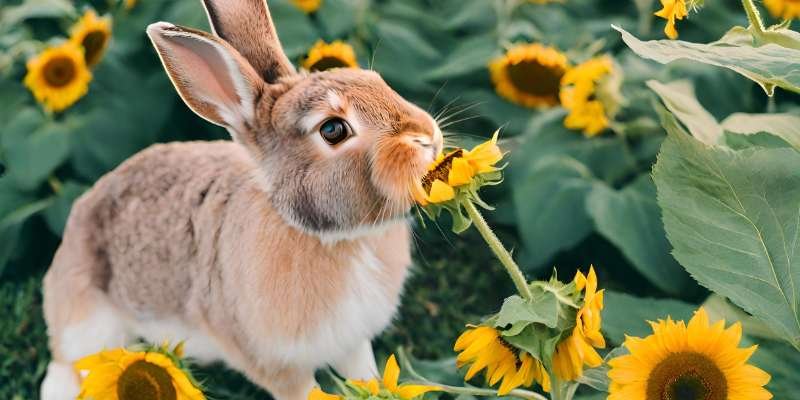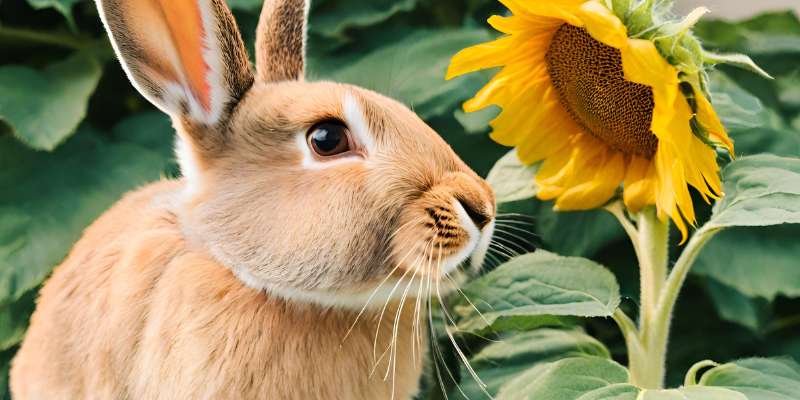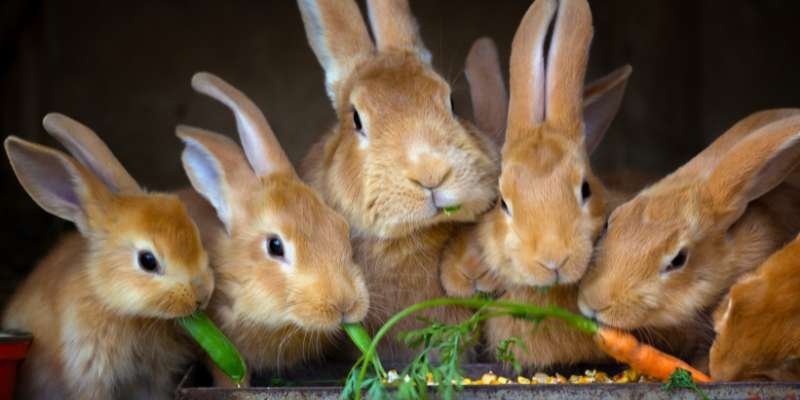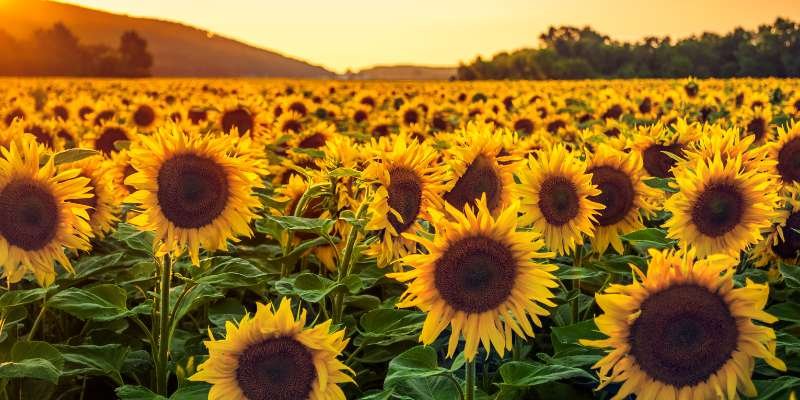Gardeners who grow sunflowers may wonder if they can feed their rabbit these beautiful yellow flowers and leaves.
Hopefully, this article will assist you in answering the question (Can rabbits eat sunflower leaves?). Check out the rest of this article to find out more!
Grass and flowers can contribute to a rabbit’s natural diet. The best diet for your pet rabbit is a natural one.
There are many plants and vegetables that your rabbit will happily eat. If you wish to feed your bunny a plant or vegetable, be sure to do your research.
Can Rabbits Eat Sunflower Leaves?
Yes. Rabbits can enjoy sunflower leaves as an occasional treat, but limit feeding to once a week for a balanced diet.
Sunflower leaves absorb a great deal of nitrate from the soil, so feeding too many leaves to a rabbit could have the opposite effect.
It is especially true if artificial fertilizer is used on plants. You should not feed sunflowers to your rabbit if they are grown in areas where there are many chemicals.
As long as you don’t use harmful chemicals in the soil when growing your sunflowers, you can feed them to your rabbit in moderation.
Also, make sure not to feed your rabbit store-bought sunflowers, since they might be sprayed with insecticides.
Even though excessive sunflower consumption could be harmful, sunflowers are edible and can be part of a rabbit’s diet on a regular basis. In moderation, this is true.
What Nutritional Benefits Do Sunflower Seeds Offer to Rabbits?
Sunflower seeds offer several nutritional benefits to rabbits when given in moderation. Here are some key nutritional components found in sunflower seeds:
- Protein: Sunflower seeds are a good source of protein. Protein is essential for the growth, repair, and maintenance of tissues in a rabbit’s body.
- Healthy Fats: Sunflower seeds are rich in healthy fats, including unsaturated fats. These fats play a crucial role in maintaining skin and coat health in rabbits.
- Fiber: While sunflower seeds are not a significant source of fiber, they do contribute some dietary fiber. Fiber is essential for a healthy digestive system in rabbits and helps prevent issues like gastrointestinal stasis.
- Vitamins: Sunflower seeds contain various vitamins, including vitamin E. Vitamin E is an antioxidant that helps protect cells from damage. It is important for immune function and overall health.
- Minerals: Sunflower seeds provide essential minerals such as magnesium, phosphorus, and potassium, which contribute to various physiological functions in a rabbit’s body.
While sunflower seeds offer these nutritional benefits, it’s important to keep in mind that they should be considered as treats and not a primary food source. Rabbits have specific dietary requirements, and their main diet should consist of hay, fresh vegetables, and a high-quality rabbit pellet. Treats, including sunflower seeds, should be given in moderation to avoid an imbalance in the rabbit’s diet, especially considering the relatively high fat content of sunflower seeds.
Always consult with a veterinarian to ensure that any treats introduced into a rabbit’s diet align with their individual nutritional needs and health status. Additionally, monitor your rabbit for any signs of digestive upset or allergies when introducing new foods, including sunflower seeds.
How to Feed Sunflower Seeds to Rabbit?
Feeding sunflower seeds to rabbits can be done in moderation, as they are a good source of protein and healthy fats. However, it’s important to remember that seeds should only be given as an occasional treat and not as a primary food source. Here are some guidelines on how to feed sunflower seeds to rabbits:
- Moderation is Key: Sunflower seeds are high in fat, so they should be given sparingly. Limit the amount to just a few seeds per day, and make sure they are part of a well-balanced diet.
- Remove the Shell: Remove the outer shell of the sunflower seeds before feeding them to your rabbit. The shell can be tough and difficult for rabbits to digest. You can buy sunflower seeds without shells or remove them yourself.
- Introduce Gradually: If you’re introducing sunflower seeds to your rabbit’s diet for the first time, do so gradually. This helps prevent digestive upset. Start with a small amount and observe how your rabbit reacts.
- Variety in Treats: While sunflower seeds can be a tasty treat, it’s essential to provide a variety of treats and not rely on one type exclusively. Fresh fruits, vegetables, and hay should make up the majority of your rabbit’s diet.
- Check for Allergies: Just like humans, rabbits can have allergies or sensitivities to certain foods. Watch for any signs of discomfort or digestive issues after introducing sunflower seeds. If you notice any problems, discontinue the treats.
Remember that each rabbit is unique, and their dietary needs can vary. Pay attention to your rabbit’s behavior and health, and adjust their diet accordingly.
Benefits of Sunflower Seeds for Rabbits
Sunflower seeds can offer some nutritional benefits to rabbits when given in moderation. However, it’s important to note that they should be considered as treats rather than a primary food source. Here are some potential benefits of sunflower seeds for rabbits:
- Protein Source: Sunflower seeds contain protein, which is essential for the growth, repair, and maintenance of tissues in the rabbit’s body.
- Healthy Fats: Sunflower seeds are rich in healthy fats, particularly unsaturated fats. These fats are important for maintaining a rabbit’s skin and coat health.
- Vitamins and Minerals: Sunflower seeds contain various vitamins and minerals, including vitamin E, which has antioxidant properties and is important for immune function.
- Energy Boost: The fats in sunflower seeds can provide a quick source of energy for rabbits. This can be beneficial, especially during colder months or for rabbits with higher energy needs.
- Enrichment and Mental Stimulation: Offering sunflower seeds as a treat can serve as a form of enrichment for rabbits. Chewing and foraging for treats can provide mental stimulation and prevent boredom.
- Variety in Diet: Including a variety of treats, including sunflower seeds, can add diversity to a rabbit’s diet. However, it’s crucial to maintain a balanced and primarily hay-based diet.
While sunflower seeds have these potential benefits, it’s crucial to emphasize that they should be given in moderation. Too many sunflower seeds can lead to an imbalance in a rabbit’s diet, as they are high in fat. A balanced and varied diet, consisting mainly of hay, fresh vegetables, and a quality rabbit pellet, is essential for a rabbit’s overall health.
General rabbit diet
Overview of a Rabbit’s Natural Diet in the Wild
Rabbits, as herbivores, eat plant material. In the wild, they graze on grasses, herbs, and shrubs. Understanding their natural diet is crucial for replicating a suitable and healthy environment in captivity.
The Importance of Hay in Rabbit Diet
-
Primary Fiber Source: Hay is a fundamental component of a rabbit’s diet, providing the essential fiber necessary for proper digestion.
-
Dental Health: Chewing hay wears down rabbits’ continuously growing teeth, preventing dental issues.
-
Digestive Function: The indigestible fiber in hay promotes a healthy digestive system, preventing gastrointestinal problems like hairballs.
Recommended Fresh Vegetables and Greens for Rabbits
-
Leafy Greens: Include leafy greens like kale, romaine lettuce, and spinach. These are rich in vitamins and minerals.
-
Herbs: Parsley, cilantro, and basil can be added in moderation for added flavor and nutrients.
-
Vegetables: Carrots, bell peppers, and broccoli are suitable options, offering vitamins and antioxidants.
-
Introducing Variety: Rotating vegetables and greens ensures diverse nutrient intake and prevents boredom.
Cautionary Notes on Feeding Rabbits Certain Foods
-
High Starch and Sugars: Limit foods high in starch and sugars, such as fruits, as excessive intake can lead to obesity and dental problems.
-
Toxic Foods: Avoid toxic foods like chocolate, onions, and garlic, which can harm rabbits.
-
Gas-producing Vegetables: Cabbage, cauliflower, and other gas-producing vegetables should be consumed in moderation to prevent digestive discomfort.
-
Seeds and Pits: Remove seeds and pits from fruits, as these can pose choking hazards and contain harmful substances.
Understanding the balance between hay, fresh vegetables, and cautionary measures is essential for maintaining rabbit health and well-being. Regular veterinary check-ups and keen observation of rabbit behavior and dietary preferences contribute to a happy and healthy companion.
A description of sunflower plants and their components
Overview of sunflower plants
-
Botanical Description: Sunflowers (Helianthus annuus) are vibrant, annual plants known for their large, daisy-like flowers and tall stems.
-
Cultivation: Widely cultivated for their seeds, sunflowers thrive in well-drained soil and are native to North America.
-
Varieties: Different sunflower varieties exist, some ornamental and others for their oil-rich seeds.
Nutritional content of sunflower leaves
-
Leaf Composition: Sunflower leaves, while less commonly consumed, contain nutrients essential for plant growth.
-
Vitamins and Minerals: Explore the presence of vitamins (A, C, K) and minerals (iron, calcium) in sunflower leaves.
-
Antioxidants: Potential antioxidant compounds within sunflower leaves and their significance for health.
Potential Benefits and Risks Associated with Sunflower Leaves
Benefits
-
Nutritional Value for Rabbits: Assess the suitability of sunflower leaves as a dietary supplement for rabbits.
-
Fiber Content: Consider sunflower leaves’ fiber content and its contribution to digestive health.
-
Variety in Diet: Explore how sunflower leaves can add variety to a rabbit’s diet, potentially preventing dietary monotony.
Risks
-
Allergenic Potential: Discuss rabbit allergic reactions to sunflower leaves.
-
Toxic Components: Investigate if sunflower leaves contain substances that could harm rabbits.
-
Digestive Concerns: Examine the risk of digestive issues associated with sunflower leaf consumption, such as gas or bloating.
Understanding the nutritional profile of sunflower leaves and evaluating potential benefits and risks is crucial before introducing them into a rabbit’s diet. Always consult with a veterinarian to ensure your rabbit’s safety and well-being, as individual sensitivities may vary.
How Many Sunflower Leaves Can You Give A Rabbit?
If you want to begin feeding your rabbit one or two sunflower leaves at the beginning, you can start by doing so. In fact, you can even cut the leaves and feed them to your rabbit in smaller pieces because they will be easier to digest.
Sunflower leaves can also be mixed with other plants and vegetables and fed to your rabbit along with the sunflower leaves.
The leaves of sunflowers are safe for rabbits, but they shouldn’t be fed regularly because they absorb a lot of nitrates.
Sunflower leaves make a great treat for your rabbit, and you can mix them with other healthy plants, flowers, fruits, and vegetables you usually feed him.
Most vegetables and greens humans eat can be fed to rabbits. Although it is always recommended to research to avoid making your rabbit ill simply by assuming that the food they are fed is safe, it is still important to ensure that it is not inadvertently causing them harm.
FAQs About Can rabbits eat sunflower leaves
Can rabbits eat sunflower leaves?
Yes, rabbits can eat sunflower leaves. Rabbits are generally safe and nutritious when given in moderation.
Are rabbits benefitted by sunflower leaves?
Yes, sunflower leaves are an excellent source of fiber, vitamins, and minerals. They can contribute to rabbit health and well-being.
How should I prepare sunflower leaves for my rabbit?
Wash the sunflower leaves thoroughly to remove pesticides or contaminants. Ensure they are fresh and wilting-free. Also, offer them as part of a varied diet to promote balanced nutrition.
Can I feed my rabbit sunflower leaves every day?
While sunflower leaves are safe, don’t feed them every day. Rabbits need a diverse diet, so rotate different vegetables and greens to ensure they receive a range of nutrients.
Are there any risks associated with feeding rabbits sunflower leaves?
In general, sunflower leaves are safe for rabbits. However, as with any new food, introduce them gradually to monitor your rabbit’s reaction. Some rabbits may be sensitive, so watch for digestive upset.
Can I give my rabbit sunflower seeds along with the leaves?
Sunflower seeds are high in fat and should be consumed sparingly. While leaves are generally nutritious, the seeds should be treated as an occasional treat due to their high caloric content.
How much sunflower leaves can I feed my rabbit at once?
Start with a small amount, such as a few leaves, and observe your rabbit’s response. If there are no adverse reactions, you can gradually increase the amount. However, always maintain an appropriate diet and consult with a veterinarian for personalized advice.
Final thoughts about Can rabbits eat sunflower leaves
Feeding your rabbit sunflower leaves can be a nutritious addition to their diet when offered in moderation. These leaves provide essential fiber, vitamins, and minerals that contribute to your rabbit’s overall health. However, it’s crucial to maintain a balanced diet by incorporating various vegetables and greens.
Always wash the leaves thoroughly, introduce changes in foods gradually, and monitor your rabbit for sensitivity. While sunflower seeds can be included occasionally, it’s essential to remember their high fat content. As with any dietary change, consulting with a veterinarian for personalized advice ensures the highest quality care for your rabbit’s well-being.
If you liked this article about Can rabbits eat sunflower leaves? You should check these articles also:






